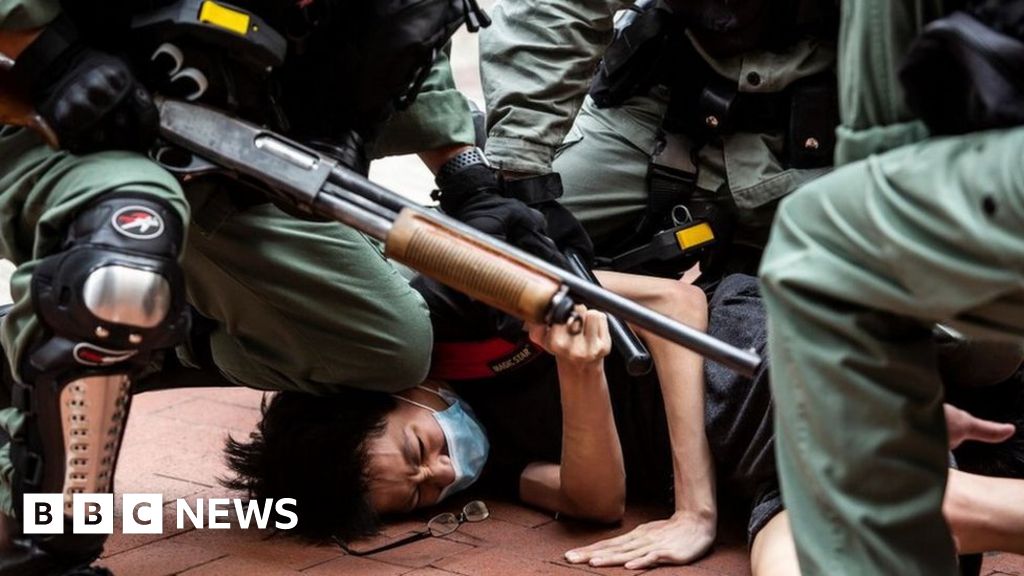Image source, Getty Images
Hong Kong’s pro-Beijing parliament passed the law unanimously after a marathon sitting on Tuesday
Scores of international public figures have criticised Hong Kong’s tough new security law, calling it yet another “devastating blow” for freedom.
Hong Kong’s pro-Beijing parliament unanimously passed the law – Article 23 – after a marathon sitting on Tuesday.
Authorities say the law is essential for stability – it targets a range of offences deemed treasonous.
But pro-democracy activists in exile told the BBC it’s a “final nail in a closed coffin”.
“The new national security legislation is going to double down the repression on freedoms in Hong Kong with extended egregious sentences and a broadened definition of national security,” said Frances Hui, an activist now based in the US.
A group of 81 lawmakers and public figures from across the world, including in the UK, US, Canada and South Korea, issued a joint statement on Tuesday expressing “grave concerns” over Article 23.
“The legislation undermines due process and fair trial rights and violates Hong Kong’s obligations under international human rights law, jeopardising Hong Kong’s role as an open international city,” the statement said.
The US said it is “alarmed” by the “sweeping and… vaguely-defined” provisions in the legislation, a concern echoed by the EU. The UK’s Foreign Secretary David Cameron said the law would “further damage rights and freedoms” and “entrench the culture of self-censorship” in the former British colony.
This sparked a strong response from the Chinese Embassy in the UK, which rubbished his remarks as “a serious distortion of the facts”.
“Hong Kong-related affairs are China’s international affairs, on which the UK side is in no position to make unwanted remarks. We urge the UK to cease its baseless accusations regarding the legislation of Article 23,” the embassy said.
Ms Hui said she is concerned the law could also be used to target HongKongers overseas, or their families and friends back home. The city has previously offered bounties for information on activists who fled overseas, and arrested four people in Hong Kong for supporting people abroad who “endanger national security”.
Ms Hui left Hong Kong in 2020 after Beijing imposed a national security law (NSL) that has since seen more than 260 people arrested. It was introduced in response to massive pro-democracy protests which engulfed the city in 2019.
Ms Hui said civil liberties in Hong Kong are “long gone” four years after the NSL took effect. Article 23 expands on the contentious legislation, while targeting new offences like external interference and insurrection. Penalties include life sentences.
Image source, Getty Images
More than 260 people were arrested since the huge protests against the 2020 national security law
Among the signatories to the joint international statement is Hong Kong’s last British governor, Chris Patten, who said the legislation is “another large nail in the coffin of human rights and the rule of law in Hong Kong and a further disgraceful breach of the Joint Declaration”.
Hong Kong was handed back to China in 1997 under the principle of “one country, two systems”, which guaranteed the city a certain degree of autonomy. While Beijing and Hong Kong both insist this is still the case, critics and international rights groups say China’s grip on the city has only tightened with time.
On Tuesday, s memes spread online comparing Article 23 to the manner in which Xi Jinping was unanimously voted in as China’s leader for a third term last year by close to 3,000 members of the rubber-stamp parliament.
Hong Kong’s leader John Lee defended the law on Tuesday, saying the legislation will help the city “effectively guard against colour revolution and those advocating Hong Kong independence”.
“From now on, Hong Kong people will never have to experience the pain we’ve experienced before,” he added.
But those who led the pro-democracy protests against China’s increasing influence on the city see the new law as yet another lost battle.
It brings Hong Kong “one step closer to the system of mainland China”, former Hong Kong lawmaker Nathan Law, who is now in exile in the UK, told the BBC’s Newsday programme.
“The chilling effect… and the result of a collapse of civil society is impacting most Hong Kong people,” he said.
Beijing is yet to comment but Chinese state media welcomed Article 23 further as legislation that would “solidify the secure foundation for the city’s development”. Another outlet said it would ensure Hong Kong would become “more prosperous and stable with the economy thriving and people leading happy lives under ‘one country, two systems'”.

Emily Foster is a globe-trotting journalist based in the UK. Her articles offer readers a global perspective on international events, exploring complex geopolitical issues and providing a nuanced view of the world’s most pressing challenges.








